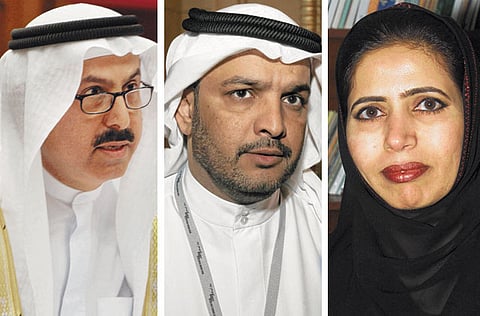Radical measures needed to fix demographic issue
Emiratisation policies the top priority, expert says

Abu Dhabi: Radical measures — which include making changes to capital-intensive industries, and changing the economic pattern which creates jobs for foreign, unskilled workers and excludes Emiratis from the labour market — are needed if efforts to better shape the demographic structure of the country are to succeed, academics and officials said.
"New labour rules aimed at liberalising the labour market and ensuring the optimal use of skilled and professional workers in the country rather than replacing them with newcomers will have limited impact on the demographic structure," Dr Ebtisam Al Kitbi, Professor of Political Science at the UAE University, told Gulf News yesterday.
Dr Ebtisam said the UAE economy created jobs for foreign, unskilled workers, and excluded Emiratis from the labour market.
The construction sector contributed 8.6 per cent to gross domestic product (GDP), but employed 47.5 per cent of the foreign manpower, according to Labour Ministry statistics.
Dr Ebtisam argued the ever-increasing reliance on foreign manpower had been accompanied by a decline in productivity and had adversely affected the sustainability of economic growth and the creation of jobs for Emiratis.
Labour Ministry figures also showed university graduates employed in the private sector accounted for only 10 per cent of the UAE work force.
Lieutenant General Dahi Khalfan Tamim, Dubai Police Chief, said a quota system for foreign workers would help address the demographic structure and maintain the identity of the country.
Dr Ebtisam said the system was being used by the Labour Ministry "but the outcome was not so impressive".
She said the solution [to the demographic structure issue] lay in massive cuts to numbers of foreign workers, but not those from Arab countries.
Efficient labour
Humaid Bin Deemas, Acting Director-General of the Ministry of Labour, said, "The new labour rules were expected to play a major role in advancing efforts towards creating an efficient labour market and sharpening competitiveness and transformation towards a knowledge-driven economy."
Saqr Gobash Saeed Gobash told the Federal National Council (FNC) earlier this month that the long-term goal to reform the sponsorship system was creating a flexible labour market that could meet development requirements.
"Our labour market must be flexible, efficient and committed to Emiratisation policies as top priority," Gobash said.
The FNC heard that out of 230,000 Emiratis aged 15 to 24 years, only 15,000 were employed in the private sector.
Foreign workers cost Dh55 billion a year in social assistance and costs, which included government subsidies for electricity and their use of public services, infrastructure and security.
Gobash said the new measures were designed to infuse broader flexibility into the labour market and strike a balance in the contractual relationship between the employer and worker.
Legal rights
"The ministry will only interfere in the employer-worker contractual relationship if it detects infringement in obligations stated in the labour contract," he said.
He affirmed the ministry's determination to guarantee the legal rights of both parties.
Sign up for the Daily Briefing
Get the latest news and updates straight to your inbox


